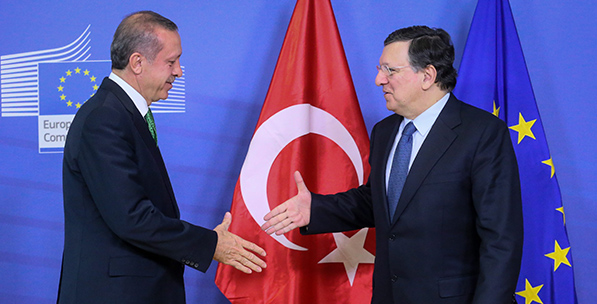A fair assessment of European Union policy on Turkey is that it displays significant fluctuations based on the specific period of time and who the decision makers are; therefore, it does not follow a consistent path. While the EU at times offers strong support for Turkey's democratization efforts, it occasionally works against its fundamental principles, including the promotion of democracy. In order to accurately analyze EU policy on Turkey, it is useful to take a brief look at the tumultuous history of Turkish democracy and recall the country's significance to the EU.
First and foremost, it is important to remember that Turkey is a country whose history and culture make it European as much as Middle Eastern. Without spending undue time discussing the significant relevance of the Ottoman Empire in European politics, it would be better to emphasize that the Turkish Republic, heir to the Ottomans, opted to remain part of the European continent and sought membership in European institutions from the 1950s onward. Today, the country remains an active member of Western organizations; including economic and military partnerships like the OEDC and NATO, as well as political institutions such as the Council of Europe, that seek to protect human rights and promote democracy. Furthermore, successive governments demonstrated strong interest in improving the nation's democratic credentials and human rights record, thereby placing full membership in the European Union among Turkey's primary objectives. Turkey has, however, had to endure various obstacles since its initial application to the European Economic Community (EEC) back in 1959.
Meanwhile, Turkish democracy suffered a number of interventions beginning with a 1960 military coup. Every following decade witnessed multiple military coups, attempted and actual, that attested to the military and civilian bureaucracy's unwillingness to wait for elected governments to be voted out of office. During this period, the military stepped in where the judiciary and others failed to render elected officials unable to govern the country. The Justice and Development Party (AK Party) came to experience such pressures from theoretically apolitical institutions following its rise to power in 2002, as a number of attempted military interventions as well as a 2008 closure trial where the Constitutional Court reached a 6-5 decision to declare the party not guilty. Similarly, the past months set the stage for a new series of plans to bypass the electoral system and topple the AK Party government.
Following this brief summary, let us now analyze Brussels' stance toward Turkey's ongoing struggle for democracy even though it remains difficult, as mentioned above, to speak of a consistent EU position on the matter. A striking case in point is the Union's shocking silence in the face of what came to be known as the "postmodern coup" of Feb. 28, 1997, in contrast to its pivotal role in dismantling the military guardianship regime -a major obstacle before democratization- during the initial years of AK Party rule. These two historic processes help demonstrate why the EU's position on Turkish democracy varied over the years.
Primarily, it is important to note that the Union's policies on Turkey often reflect competing notions about the EU's relationship with Turkey and its EU membership that various European cliques advocate. Historically, political developments in Germany, which hold considerable influence over European foreign policy, inevitably affect the Union's stance toward Turkey. Gerhard Schröder's social democratic government, for instance, adopted a straightforward position that identified democratic shortcomings, not religion or geographic location, as Turkey's main challenge in seeking full membership. Unsurprisingly, the EU offered exceptional support to strengthening Turkish democracy and improving the country's human rights record between 2002 and 2005 when Berlin and Ankara saw eye to eye on Turkey's EU membership. In contrast, both the German government








